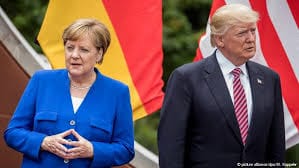
Trump chooses a senseless withdrawal from Germany. He threatens national security.
IN A transparent attempt to boost his sagging political fortunes, President Trump proposed to stage a summit meeting of the Group of Seven nations in Washington this month, with Vladimir Putin among the special guests. In a May 30 phone call that reportedly turned testy, German Chancellor Angela Merkel demurred, citing the continuing threat of the covid-19 pandemic as well as the lack of preparation for such a meeting.
One week later, Trump’s riposte to Ms. Merkel surfaced: a vindictive and, for U.S. national security, deeply damaging decision to withdraw nearly a third of the American troops stationed in Germany. The move was made without consultation with the Germans, other NATO allies or even senior U.S. military officers in Europe, who were taken by surprise when the story emerged on Friday.
The pullout, which Mr. Trump arrived at in the absence of any National Security Council deliberation, could substantially weaken U.S. ability to deter Russian aggression in Europe or respond to other foreign crises. However, shortly after speaking with Ms. Merkel, Mr. Trump initiated a phone call with Mr. Putin, who will be thrilled by the president’s unilateral disarmament and exacerbation of a rift with a key ally.
Mr. Trump appears to believe he is punishing Ms. Merkel by removing forces that nominally defend Germany. The sycophant whom the president installed as ambassador to Germany, Richard Grenell, has been arguing publicly that Germany doesn’t merit U.S. bases when it fails to meet NATO defense spending guidelines. What he and the president fail to understand is that the 34,500 U.S. personnel in Germany — down from 235,000 during the Cold War — primarily bolster U.S. defense. The Ramstein Air Base is vital to operations in the Middle East and Africa, and the Landstuhl Regional Medical Center provides critical care to wounded American soldiers medevaced from Iraq and Afghanistan.
Mr. Trump has been impervious to serial attempts over the past three years by his national security advisers and senior military commanders to explain such basics to him. Instead, conceiving U.S. troops as mercenary forces who should be deployed only when host countries offer compensation he regards as adequate, he also has been threatening to pull troops out of South Korea — which would delight another dictator, North Korea’s Kim Jong Un.
